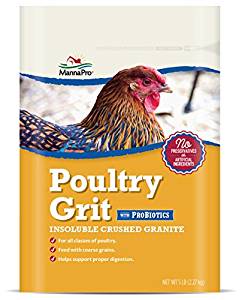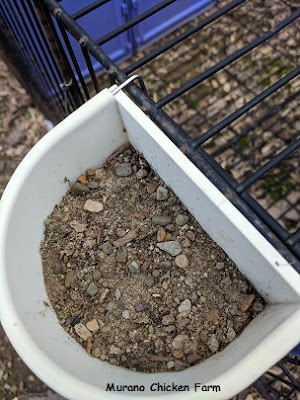Let me clarify....grit is absolutely necessary for the chickens digestive system to run smoothly, but you don't need to spend money on it! Grit is simply tiny rocks that the chickens use to grind their food up so that it digests easily.
You see, chickens don't have teeth. So while they do try to rip off small pieces of food, they pretty much just swallow everything whole. I mean everything!
Serabelle even swallowed a frog whole once (once that I've seen, Yuck!) It would be really hard on the body to digest food whole like that, so the food needs broken down somehow. That is what the gizzard does.
Why chickens need grit
The gizzard is a specialized stomach constructed of thick muscular walls, used for grinding up food, often aided by particles of stone or grit. Wiki Grit is necessary for the gizzard to function properly. It basically acts in lieu of teeth, grinding up the food since chickens can't chew their food.
Here's how the chickens digestive system works:
1) Chicken eat the food and it goes down the esophagus into the crop.
2)The food can stay in the crop for up to 12 hours before it moves on to the stomach.
3) In the stomach the digestive enzymes are added before moving the food on to the gizzard.
4) The gizzard churns and flexes, grinding up the food into smaller, digestible particles by smashing it together with small pieces of stone.
5) The now smaller particles of food move into the small intestine where the nutrients are absorbed.
6)The food passes through the ceca where bacteria help break the food down further.
7)The food then continues on to the large intestine before moving through the cloaca and exiting through the vent.
Nutrena has a good description of the chickens digestive system if you want more details!
As you can see, the food gets ground up by the gizzard right before it reaches the small intestine where the nutrients are absorbed. If the chicken food is not ground up by the gizzard, the nutrients would not be as available to the chicken to absorb.
For this reason, it is absolutely essential that chickens have grit in their diets.
We also wouldn't want a whole frog to get stuck in there somewhere, would we Serabelle? *sigh* Gotta break that thing down so it can move through easily.
Types of grit you can buy:
Insoluble grit: Usually flint, granite or other type of rock. Does not break down easily in the gizzard.
Soluble grit: usually Oyster Shell. This adds a calcium boost and does break down in the gizzard. Not a true grit...more of a calcium supplement. I prefer to feed my chickens their own eggshells instead of buying oystershell.
I personally buy a 50 pound tube of contractors sand at home depot and put it in a container in their run. (see picture) It costs less than $5 and has all different sized pebbles and sand in it. If I use a large container, sometimes they dust bathe in it! Many people do not buy any type of grit for their flocks and they do just fine.
If your chickens free range then they will be able to pick up all the small rocks and pebbles they need as they search for bugs and such. If your chickens are confined to a grass run though, you will have to provide them with a small bowl of grit, small pebbles or course sand.
Chicks don't need grit as long as they're only on chick starter. Once treats are added to their diet I add a small bowl of sand to their brooder. Chicks that free range will be able to get their grit from the ground like the adult chickens do, so they won't need added grit.
Grit is just one of the many chicken keeping expenses you can cut to save money!
~L
Want information on raising chickens sent right to your email weekly? Click right here to join my list and get new posts sent directly to you the day they're published ... plus, you'll also get the free download '25 Ways to save money raising chickens'.
This post contains affiliate links. If you chose to purchase something through the link, I will get a small payment from Amazon. It will not affect your purchase price. Click for full disclosure.
I am not a veterinarian or other animal care professional nor do I claim to be. I am simply passing on information that has worked for me and my flock. This information is for entertainment purposes only and is not meant to treat or diagnose any medical condition. Please see a vet if your chicken is ill. Click for my full disclaimer.





No comments:
Post a Comment